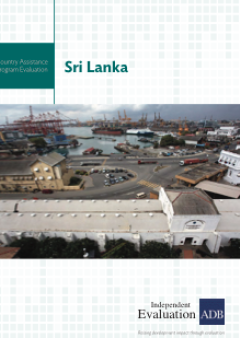
Country Assistance Program Evaluation for Sri Lanka
DB support for Sri Lanka over 2006–2015 was found to be successful. ADB operations achieved substantial progress toward most of their country partnership strategy development objectives, particularly in the infrastructure sectors and education in which notable improvements in service delivery were made. ADB support was relevant to the government's Development Policy Framework, which called for higher investment in infrastructure in lagging regions and service expansion in transport, energy, and water and sanitation. Even so, while ADB was able to scale up its delivery, there was declining attention to sector and macroeconomic policy reform over the period.
The program was rated broadly effective in all sectors, except for sovereign operations in the finance sector, which were rated less than effective, on account of poor commitment and ownership by the government plus a lack of political will to carry out reforms. Development impact ratings were also in line with this, with a lower score for the sovereign financial sector program.
The sustainability of the impressive infrastructure achievements remains a key risk, especially for transport, energy, and multisector operations, which were rated less than likely sustainable. There is evidence that ADB's attention to policy reform in each infrastructure sector declined over the evaluation period while lending increased. The proportion of technical assistance to total loan approvals also declined. This reflects the government's push to increase infrastructure investment over the period, while at the same time closing channels for policy dialogue.
Looking ahead to the next country partnership strategy period, ADB's loan portfolio and the government's development programs face significant sustainability risks. As Sri Lanka transitions to an upper middle-income country, access to concessional financing and technical assistance will decline putting the development agenda at risk unless domestic revenues can be adequately raised. The current government faces an uphill challenge to increase domestic tax revenues, and to attract the levels of private investment needed to expand services, and sustain growth. Sri Lanka needs ongoing support to consolidate its development achievements, reduce regional disparities, ensure inclusive growth, protect the environment, and sustain peace. In the next country partnership strategy, ADB should scale up its support for policy reform, private sector development, environmentally sustainable growth, and human capital development.
